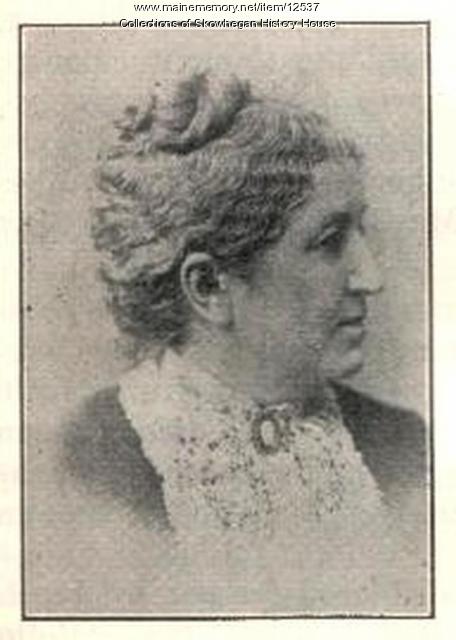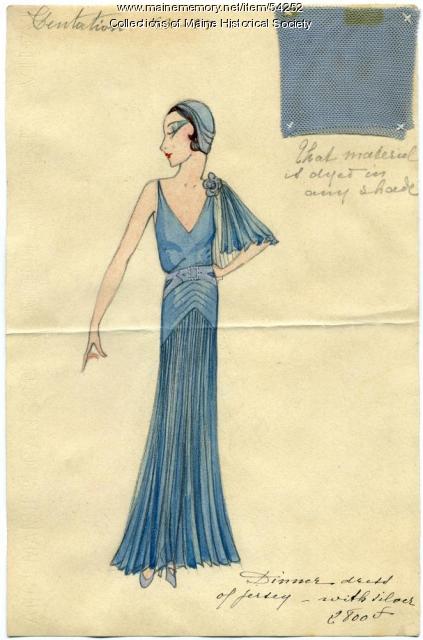Keywords: Women's schools
- Historical Items (325)
- Tax Records (0)
- Architecture & Landscape (1)
- Online Exhibits (89)
- Site Pages (213)
- My Maine Stories (30)
- Lesson Plans (1)
Online Exhibits
Your results include these online exhibits. You also can view all of the site's exhibits, view a timeline of selected events in Maine History, and learn how to create your own exhibit. See featured exhibits or create your own exhibit
Exhibit
In Maine, like many other states, a newly formed Ku Klux Klan organization began recruiting members in the years just before the United States entered World War I. A message of patriotism and cautions about immigrants and non-Protestants drew many thousands of members into the secret organization in the early 1920s. By the end of the decade, the group was largely gone from Maine.
Exhibit
Fallen Heroes: Maine's Jewish Sailors and Soldiers
Thirty-four young Jewish men from Maine died in the service of their country in the two World Wars. This project, including a Maine Memory Network exhibit, is meant to say a little something about some of them. More than just names on a public memorial marker or grave stone, these men were getting started in adult life. They had newly acquired high school and college diplomas, they had friends, families and communities who loved and valued them, and felt the losses of their deaths.
Exhibit
Maine is home to dozens of summer-long youth camps and untold numbers of day camps that take advantage of water, woods, and fresh air. While the children, counselors, and other staff come to Maine in the summer, the camps live on throughout the year and throughout the lives of many of the campers.
Exhibit
MY ISLAND HOME: Verlie Colby Greenleaf of Westport Island
Verlie Greenleaf (1891-1992) bore witness to over a century of Westport Island's history. Many changes occurred during Verlie's 100-year life. Verlie Greenleaf donated photographs, personal notes, and sat for an interview in 1987, all part of the Westport Island History Committee's collection. Her words frame this exhibition, providing a first-person account of her life.
Exhibit
Student Exhibit: Rebecca Sophie Clarke
Sophie May, whose real name was Rebecca Clarke, was the author of over 40 books between 1861 and 1903. She wrote the "Little Prudy Series" based on the little town of Norridgewock.
Exhibit
World War I and the Maine Experience
With a long history of patriotism and service, Maine experienced the war in a truly distinct way. Its individual experiences tell the story of not only what it means to be an American, but what it means to be from Maine during the war to end all wars.
Exhibit
World Alpine Ski Racing in Maine
Sugarloaf -- a small ski area by European standards -- entered ski racing history in 1971 by hosting an event that was part of the World Cup Alpine Ski Championships. The "Tall Timber Classic," as the event was known, had a decidedly Maine flavor.
Exhibit
Drawing Together: Art of the Longfellows
Henry Wadsworth Longfellow is best know as a poet, but he also was accomplished in drawing and music. He shared his love of drawing with most of his siblings. They all shared the frequent activity of drawing and painting with their children. The extended family included many professional as well as amateur artists, and several architects.
Exhibit
Rebecca Usher: 'To Succor the Suffering Soldiers'
Rebecca Usher of Hollis was 41 and single when she joined the Union nursing service at the U.S. General Hospital at Chester, Pennsylvania. Her time there and later at City Point, Virginia, were defining experiences of her life.
Exhibit
Rum, Riot, and Reform - Business as Usual
"GALLERIES: Politics and Enforcement | Women Leaders and Temperance | Quenching the Thirst | Business as Usual"
Exhibit
Northern Threads: Silhouettes in Sequence, ca. 1780-1889
A themed exhibit vignette within "Northern Threads Part I," featuring a timeline of silhouettes from about 1775 through 1889.
Exhibit
The Schooner Bowdoin: Ninety Years of Seagoing History
After traveling to the Arctic with Robert E. Peary, Donald B. MacMillan (1874-1970), an explorer, researcher, and lecturer, helped design his own vessel for Arctic exploration, the schooner <em>Bowdoin,</em> which he named after his alma mater. The schooner remains on the seas.
Exhibit
The Sanitary Commission: Meeting Needs of Soldiers, Families
The Sanitary Commission, formed soon after the Civil War began in the spring of 1861, dealt with the health, relief needs, and morale of soldiers and their families. The Maine Agency helped families and soldiers with everything from furloughs to getting new socks.
Exhibit
Fallen Heroes: Those Who Gave Their Lives: World War II
At least twenty-three Jewish men from Maine died in the military during World War II. Photographs and other memorabilia are available for fewer than half of them. Read more about them.
Exhibit
By the second half of the 20th century, skiing began to enjoy unprecedented popularity. Pleasant Mountain in Bridgton (later Shawnee Peak) was Maine's foremost place to join the fun in the 1950s and 1960s.
Exhibit
In 1857, when Daniel Cough left Amoy Island, China, as a stowaway on a sailing ship from Mt. Desert Island he was on his way into history as the first Chinese person to make his home in Maine. He was soon followed by a cigar maker and a tea merchant who settled in Portland and then by many more Chinese men who spread all over Maine working mostly as laundrymen.
Exhibit
Cosmopolitan stylings of Mildred and Madeleine Burrage
Born in Portland, sisters Mildred Giddings Burrage (1890-1983) and Madeleine Burrage (1891-1976) were renowned artists and world travelers. Mildred's experiences studying painting in Paris and Italy, and the sisters' trips to Mexico and Guatemala inspired their artwork and shared passions for cosmopolitan and stylish attire. Housed at Maine Historical Society, The Burrage Papers include selections of original advertising drawings called "line sheets" from Parisian fashion houses dating from 1928 to 1936. Images of Madeleine's gemstone jewelry and Mildred's artwork accompany intimate family photographs of the sisters.
Exhibit
Elise Fellows White: World Traveling Violin Prodigy
Elise Fellows White was a violinist from Skowhegan who traveled all over the world to share her music.
Exhibit
A Brief History of Colby College
Colby originated in 1813 as Maine Literary and Theological Institution and is now a small private liberal arts college of about 1,800 students. A timeline of the history and development of Colby College from 1813 until the present.
Exhibit
Home: The Wadsworth-Longfellow House and Portland - The Wadsworth Era: 1786-1807
"… Elizabeth, 18, were cultured and refined young women whose favorite pastimes (when not helping at home) were reading, writing letters, playing the…"
Exhibit
Civil Defense: Fear and Safety
In the 1950s and the 1960s, Maine's Civil Defense effort focused on preparedness for hurricanes, floods and other natural disasters and a more global concern, nuclear war. Civil Defense materials urged awareness, along with measures like storing food and other staple items and preparing underground or other shelters.
Exhibit
Shaarey Tphiloh, Portland's Orthodox Synagogue
Shaarey Tphiloh was founded in 1904 by immigrants from Eastern Europe. While accommodating to American society, the Orthodox synagogue also has retained many of its traditions.
Exhibit
Scientist, author and explorer Donald B. MacMillan established Wiscasset as his homeport for many of the voyages he made to the Arctic region starting in the early 1920s.
Exhibit
Art of the People: Folk Art in Maine
For many different reasons people saved and carefully preserved the objects in this exhibit. Eventually, along with the memories they hold, the objects were passed to the Maine Historical Society. Object and memory, serve as a powerful way to explore history and to connect to the lives of people in the past.
























